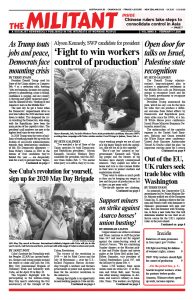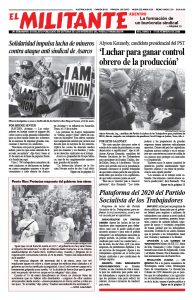In a high-profile escalation of Washington’s campaign against intellectual property theft by the rulers in Beijing, FBI agents arrested professor Charles Lieber, chair of Harvard University’s department of chemistry and chemical biology, Jan. 28. He was charged with lying to federal investigators about receiving millions of dollars in funding from Chinese institutions and hiding his involvement in the Thousand Talents Plan, Beijing’s program to attract top foreign-educated scientists to China.
“Chemistry, nanotechnology, polymer studies, robotics, computer science, biomedical research” were listed by Andrew Lelling, the lead federal prosecutor in Boston, as the sciences involved in the cases before them. These are “not an accident or a coincidence” he said. “This is a small sample of China’s ongoing campaign to siphon off American technology and know-how.”
The bureaucratic rulers in Beijing are on a forced march to develop their own self-sufficient internet and cellphone networks, as well as more advanced scientific systems. These are intended for exclusive use in China and in drawing countries in the region into reliance on them.
Two other scientists, both Chinese nationals, were indicted the same day as Lieber. Zaosong Zheng, a Harvard-sponsored cancer researcher, was charged with trying to smuggle biological material out of the U.S. He allegedly had 21 vials of cells, stolen from a Boston laboratory, hidden in a sock as he tried to board a plane to Beijing last December.
Yanqing Ye, a researcher at Boston University’s department of physics, chemistry and biomedical engineering until she left for China last April, was accused of hiding the fact she was previously a lieutenant in the People’s Liberation Army and that while in the U.S. she continued to receive assignments from Chinese military authorities.
She is alleged to have accessed U.S. military websites and researched U.S. scientists with expertise in robotics and computer science, sending the information to Beijing. She was charged in her absence with visa fraud, making false statements, acting as an agent of a foreign government and conspiracy.
The criminal charges against Lieber caused a shock in scientific circles, since he is a pioneer in nanotechnology, the science of manipulating individual molecules and atoms. His work was credited with helping to develop “bio-nanoelectronic sensors capable of detecting diseases down to the level of a single infectious virus particle.” Ironically, he was charged just as a global health emergency scare has erupted over the new coronavirus epidemic spreading from China.
The arrests and increased U.S. government attention to theft of scientific research and technological innovation for China are potentially very disruptive to “American science,” said Frank Wu, a law professor and former president of the Committee of 100, an organization of prominent Chinese Americans. “The number of people who have some connection to China is so vast.”

